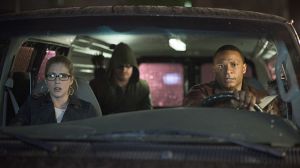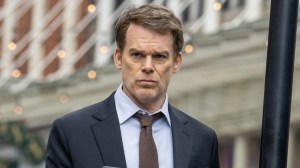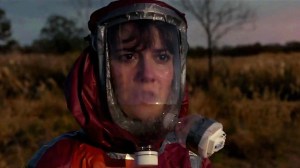Movie fans have seen war stories brought to life for decades, as filmmakers have taken a variety of approaches to envisioning the horrors of war. From The Great Escape to Platoon to Saving Private Ryan, fans have seen more bombastic interpretations of combat, while Full Metal Jacket, Apocalypse Now, and Jarhead explore overlooked psychological damage caused by conflicts. Even more recently, movies like Dunkirk and 1917 have taken ambitious cinematic approaches to tell tales of valor and perseverance, but Alex Garland and Ray Mendoza’s Warfare takes another approach that puts the audience in the middle of a conflict in arguably the most authentic war story put to film.
Videos by ComicBook.com
A24 describes the film, “Written and directed by Iraq War veteran Mendoza and Garland (Civil War, 28 Days Later), Warfare embeds audiences with a platoon of American Navy SEALs on a surveillance mission gone wrong in insurgent territory. A visceral, boots-on-the-ground story of modern warfare and brotherhood, told like never before: in real time and based on the memory of the people who lived it.”
“It starts with trust. I wasn’t gonna go down this road with somebody that I did not trust. Working in this industry, there’s lots of entities or groups. If I were to give this film [to them], they would just destroy it and it’d be a disgrace,” Mendoza explained to ComicBook of his decision to develop the film with Garland. “And so it starts with the trust and A24 giving us the autonomy to do what we wanted to do. So that was a big part of my decision to do it. Then the next question was, if I was ready to do it, which I felt I was. I gave everyone a call. I’m a team-oriented guy, so I like working with friends, just like this. If I’m gonna go through this, I wanna go through it with the guys over there who are also continue to be my friends.”
As far as the emotional toll the project took on him, Mendoza detailed, “There’s definitely emotions there that I’ve pushed down. I’ve scratched the surface on them, but to go to this amount of depth and to the extent of recreating it, I had to be responsible about it, for myself. Guys were there. Elliott [Miller] was there and we talked about it and there’s a moment that was very emotional. D’Pharaoh [Woon-A-Tai] is pulling Cosmo [Jarvis] up the driveway. That was a powerful moment for me. It was a pivotal moment in my life, and yeah, there were emotions. It was therapeutic, though.”
Despite the wealth of firsthand knowledge the filmmakers had about the real-life event, there were still small gaps in the recollection of the events, with Garland explaining the process of filling in these gaps.
“The simple answer … is talk to Ray. Get all the information we could accumulate together and put it down, structure it in a script form, and there were gaps. There were gaps for all sorts of different reasons. Some of them were to do with the way memory works, time passing, memories created under extreme stress, and some of them to do with concussion,” the filmmaker detailed. “But we had the option or the ability to then talk to lots of other people and get lots and lots of other perspectives that helped build it up and bring it together. There wasn’t exactly invention of scenes … If you see, for example, a group of soldiers watching a ‘Call on Me’ video, that’s because that was a ritual that these guys did before going out on an operation. However, just to be honest about it, sometimes memories conflict and then we would have complicated discussions about what we believe the truest state of that memory was because of the different accounts that we have.”
He continued, “And then other times, there are moments of invention, but they tend to be textual. So, for example, it could be someone scratching their head or someone wiping dust off a bed frame. That is something an actor is doing in the moment to inhabit a space. It’s not that you’d say, ‘Yes, at this moment, someone wiped dust off there.’ But in terms of the moments around that that are informing that actor’s decision, that has to do with the period of time that was spent waiting or the moment a grenade got pushed through a hole that had been created for a sniper … The simple answer is: it was complicated. It was forensic at times, and we had something very, very simple at the heart of it, which was just to be as truthful as it was possible to be.”
The filmmakers weren’t the only ones who faced unexpected challenges, as the cast was also tasked with replicating not only real-life events, but sometimes replicating real-life people, who could even be on set with them while filming.
“I just want to say that I’m grateful that Ray just chose to pick me and chose to have me play him through one of his most traumatic experiences of his whole life. In all honesty, for all of us, he could have just hired veterans and veterans could have just done all of this, but instead, he took the time, three weeks of his work to train us every single day, and he was there for us every single day,” Woon-A-Tai shared of depicting Mendoza. “It was definitely a lot of pressure. I mean, come on. A very traumatic experience, the guy who lived it was right behind that camera. He wrote every single word down on that script. So to say I had pressure was definitely an understatement, but again, we all did. We all were representing somebody real and somebody who never had their story told before. A lot of these guys never had their story told before, so the fact that this is their first time that they’re still their own personal stories being exposed on a worldwide basis, we all had pressure.”
Jarvis added, “It was oddly reciprocal because the people that were making it really wanted it to be authentic, and we all wanted it to be as authentic as they wanted it to be, and to have the man whose portrayal you’re responsible for in front of you while you’re portraying him is just a very unique thing to have happened … I need him, and he, I don’t want to say he needs me, but he wants it to be good, and I want it to be good, and we all did. Everybody was playing real people, and so we all, the whole group, wanted to do right by these guys and what they experienced during this event.”
To help bring the movie to life as authentically as possible, the actors didn’t merely arrive on set and start filming, as they spent weeks together building the bonds of friendship, as well as enduring rigorous physical training to help get them into the appropriate mental state.
“One thing we never lost sight of was the fact that we were actors, and so our task was really in trying to authentically represent this elite and highly trained group of individuals as best we could in a relatively limited amount of time. Basic underwater demolition SEAL training is known for being highly attritional and really having a very, very small success rate,” Will Poulter explained of the challenge of both preparing and filming. “We knew that our training was going to be a replication that we could handle in a short period of time. I’m really proud of all the guys and what we managed to achieve collectively in terms of representing that skill set and the individuals we were lucky enough to represent.”
He confirmed, “I think the most challenging thing was just maintaining the energy throughout the shoot and making sure that, every turn, we weren’t falling prey to some of the instincts we had as actors, because sometimes your instinct is to play the emotion of a scene or characterize something too much, but we constantly reminded each other of the need to just be led by protocol and be led by the higher mission of this project, which was to do something that was very honest and very literal and didn’t really seek to entertain, but sought to just depict before anything else.”
As far as how this shoot compared to expectations, Kit Connor confessed, “I think I went into it completely unsure as to what this production would look like, in terms of the making of it. I had a deep trust in Alex, as a fan of his work, along with Ray, to be able to create an ensemble of actors that would be able to really commit themselves to doing it. But I could never have expected quite the success rate that they would have. They really assembled such a talented ensemble, and not just that, but also an ensemble of really committed and hardworking actors. I was incredibly humbled to be a part of it, but then also just incredibly proud to be a part of such a professional and hardworking group of people, and also just an incredibly good group of people. I got the experience of just being able to work with a lot of really great people … There really isn’t a bad egg in the group, and they all just held themselves to such a high standard, as we all did, which was really very inspiring to see.”
With a run time of only 95 minutes, the film unfolds relatively close to real time. Even before stepping on to set, actor Charles Melton knew how unique the project would be, based solely on his intial read of the script.
“It read like a transcript, there were no arcs,” Melton pointed out. “It was based off of memory and truth of actually what happened that day, which was corroborated by a lot of different people, and it went from moment to moment to moment to moment, all these things and moment-to-moment experiences. I felt like it was a documentary, so to speak, of what happened and that was very interesting. There wasn’t a character arc or this happened and this person’s thinking about that. It was just this true telling of what happened that specific day that felt very authentic.”
Going along with that idea of the script avoiding character arcs, while there’s moments where audiences can connect with individuals within the group, the narrative arc feels more reflective of the unit as a whole. Joseph Quinn, who recently starred in another iconic group with The Fantastic Four: First Steps, reflected on the concept of blending in with his castmates as opposed to trying to stand out from the squad.
“Whilst I love my Fantastic family, there is a responsibility for each part in that dynamic, and that was a beautiful experience. We were passing the ball around in that experience in a similar way to this, actually, but I suppose the fact that there’s just far more members of this ensemble and the context of it being a SEAL team is that there was really very little room for any kind of ostentatious acting or anything,” Quinn admitted. “We were all there to tell the story of what happened to these men, and that was very liberating, in a way. It was important to invest in the team itself, in the unit itself, because that was … if you don’t care about this unit, and if you don’t believe this unit cares about each other, you don’t have a film, I don’t think. And so that was a very astute use of investing time from Alex and Ray to try and curate this culture between us all, which I do believe you see in the film.”
Warfare lands in theaters on April 11th.








